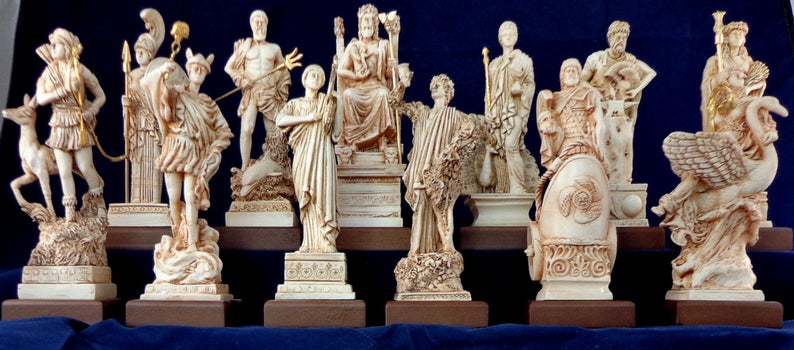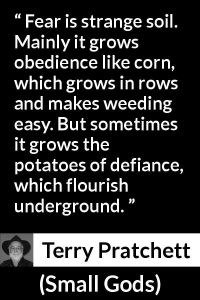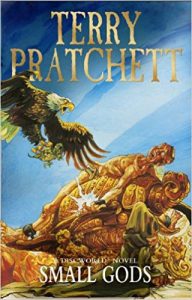Humanity’s first experience was with the primal gods. Primitive humanity moved about the planet trying to survive, and it developed a relationship based on fear of the natural forces around it. Built from the seven Hidden Gods, they had the power to create masks for these primal forces. These masks allowed them to understand natural effects, build up myths around them, and relate to them. Like many relationships based on fear, these were not too successful. Humans created monsters that haunted their nights and needed supplication and sacrifice. Gradually humanity evolved past these fears enough to develop those higher emotions and could slowly replace the primal gods with those more intricately linked to the hidden seven.
Humanity could not understand the seven forces except through the masks that they created. One man, or culture, might see Venus as a harlot while another would see her as fertility. All gods are an aspect of the seven, including those that claim to be a monotheist. Pure monotheism is a difficult concept to imagine. Monotheists might think they are worshipping one God, but they all give that god different attributes. Jesus has paradoxical masks of being love and yet apparently a harsh judge who tortures people for eternity. In terms of the Hidden Gods, these are two different rays with a similar mask.
A mask is created through several evolutionary stages, and all of them start small with a single person.
Small Gods
A small god is one person’s perception of a natural force or even another god. It is born when it is sufficiently different from the energy or the god from which it sprang, to be changed in the eyes of its human creator. In ancient times nature or house spirits were the most obvious small gods. A beautiful scene in Nature might move a religious person and assume a god inspired that and sacrifice a goat. Houses had a house god who bought wealth and prosperity if he was kept happy.
But with the rise of “monotheism,” other small gods started to appear. From ancient times no one could agree on the Nature of Jesus, so lots of little Jesus gods were created with different associated myths. Some of these grew and evolved; others disappeared without a trace.
Small God Features
Small Gods have the following features:
They are insecure: A Small God owes its existence to one person. If that person dies or is unable to pass on the worship of their god to others, it will fade away. In the early days, it behaves exactly like an insecure neurotic demanding ever more attention, offerings, and sacrifices.
They demand repetition and ritualistic acts: Small gods develop power through regular workings and sacrifices. These can be food, candles, or the insistence on daily bible study.
They insist on the same moral code as their creator: The mask of a small god comes from one person’s world view. If they are homophobic then the Small God will be too, it will hate what he or she hates and like anything that the person aspires.
Small Gods are more extreme in their emotional reaction to events: Being built by a human means that they have the same myopic view of the universe. Petty slights become significant to a Small God (mostly because they are the only thing they can do much about).
Small Gods have far less power: Built from the limited imagination of one person, the powers of a Small God are restricted to the odd “miracle” or the “perception of a miracle.” In their early days, a small God cannot do anything but relies on its creator to associate a miracle to it and believe it was responsible. Once “faith” is confirmed, they can do more.
Small Gods need converts: For a Small God to grow, it needs to convince others of its existence and beliefs. You will find those who follow a small god are more likely to “share the good news.” A small god desires to evolve, and it will only do that if others give them the same emotion and power.
The evolution from Small to a Greater god
Assuming all goes well, and a small god gets enough followers, it becomes more relaxed. The mask becomes watered down by the perceptions of many different followers. Ideas become less extreme as more people apply thought and theology to them. There is one phase which a medium-sized god must go through before it becomes a greater god and that is a requirement for a human sacrifice. This is when a god is so important that people are prepared to die rather than renounce their belief. One way this can be successful is through a religious war with the god getting more power as the body count rises.
Greater God
Once a Greater God is established, it has the patterns, legends and theology to keep going. But there will be those who see the greater god different from anyone else and will schism off to workship a Small God instead. For example, the US fundamentalist movement thought that liberal political values were leading to a moral decline. It created a small Jesus who was happy with capitalist values and hated black people, Catholics, liberals, immigrants and the poor to replace what was taught in the established churches.
Ironically, the higher the god, the less it cares about its worshipers and does not need to have a personal relationship with them. Greater Gods are more distant, do not need sacrifices (although they are always offered). They are less likely to be angry but perform fewer miracles for their followers. What they do seem to do is the function for which they were initially intended. Big Jesus acts as a scapegoat for human weakness, Zeus helps order the universe, etc
Magicians and Small Gods
By accident, magicians sometimes create small gods. In the process of experimenting with the universe, they end up believing it works in a way, and they create a religion. Sometimes working with their spiritual forces, they might make a dead human into a Small God – something familiar among channellers. Still worse is when they take a less developed God and make it into a small God of their own by fitting it into their theology.
I have a small god of this house, but I do not work with small gods and try to squash them when they are created. It is better to work with the larger, more abstract Gods and their Daemons. They do not demand faith, they come with symbols and do not have a crusade pre-packed.
Recently, a woman bragged on Facebook that she had cursed another for hitting on her husband. Apparently, in the name of her goddess, the woman got cancer and had to have a double mastectomy. In this magician’s view, and the opinion of the small goddess she was worshipping, men were women’s property and to look at another was worthy of death. A Greater Goddess would not have seen it that way. She would have thought that the problem was the magician’s neurotic insecurities and she certainly would not have acted on any curse. A small Goddess desperate to reflect its founder’s insecurities would be quick to claim credit for the victim’s unfortunate state of health.
Further reading
The best text book for understanding Gods and their evolution from Small Gods to Greater Gods can be found in Terry Prachett’s novel Small Gods



Comments are closed